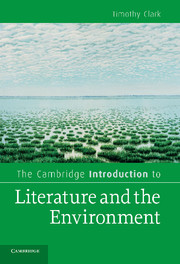Book contents
- Frontmatter
- Contents
- List of illustrations
- Preface
- Acknowledgements
- Introduction
- Romantic and anti-romantic
- The boundaries of the political
- Science and the struggle for intellectual authority
- Chapter 14 Science and the crisis of authority
- Chapter 15 Science studies
- Chapter 16 Evolutionary theories of literature
- Chapter 17 Interdisciplinarity and science
- The animal mirror
- Notes
- Further reading
- Index
- Cambridge Introductions to …
Chapter 14 - Science and the crisis of authority
Published online by Cambridge University Press: 05 June 2012
- Frontmatter
- Contents
- List of illustrations
- Preface
- Acknowledgements
- Introduction
- Romantic and anti-romantic
- The boundaries of the political
- Science and the struggle for intellectual authority
- Chapter 14 Science and the crisis of authority
- Chapter 15 Science studies
- Chapter 16 Evolutionary theories of literature
- Chapter 17 Interdisciplinarity and science
- The animal mirror
- Notes
- Further reading
- Index
- Cambridge Introductions to …
Summary
The disenchantment thesis
Disenchantment: that the natural world has lost its magic, that rivers are reduced to an energy source for hydroelectric dams, the sea to a thoroughfare for oil tankers and a vast waste disposal site – these are now widespread perceptions. In intellectual life they often feed into the so-called disenchantment thesis: that is, that the more the world becomes thoroughly mapped and understood in formalised scientific laws, the less personally and immediately meaningful it seems to become. Jane Bennett traces the thesis that the domination of science has deprived the world of all human significance to the work of Max Weber and others. She offers the following summary:
There was once a time when Nature was purposive, God was active in the details of human affairs, human and other creatures were defined by a pre-existing web of relations, social life was characterized by face-to-face relations, and political order took the form of organic community. Then, this pre-modern world gave way to forces of scientific and instrumental rationality, secularism, individualism, and the bureaucratic state – all of which, combined, disenchant the world.
Bennett, however, argues that the disenchantment thesis is exaggerated. That modern science is not necessarily a mode of disenchantment is suggested, among other things, by the rise of the popular science book. The success of books such as Richard Fortey's Trilobite! Eyewitness to Evolution (2001) shows public fascination even for an unsensational family of extinct arthropods.
- Type
- Chapter
- Information
- The Cambridge Introduction to Literature and the Environment , pp. 143 - 155Publisher: Cambridge University PressPrint publication year: 2011

